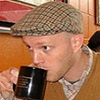1.11: Medieval Learning
- Page ID
- 21431
Despite the biases of later Renaissance thinkers that the medieval period was nothing but the “dark ages,” bereft of learning and culture, there were very important intellectual achievements in the period of 1000 – 1400 CE. Most of these had to do with foreign influences that were taken and reshaped by European thinkers, from the ancient Greeks and Romans to innovations originating in the Islamic empires to the south and east of Europe.
Likewise, despite the problems of corruption and ignorance among members of the clergy, scholarship did continue and even prosper within the church during the late Middle Ages. Numerous priests were not only literate in Latin and deeply knowledgeable about Christian theology, but made major strides in considering, debating, and explaining the nuances of Christian thought. Thus, it is a mistake to consider the medieval church as nothing more than a kind of "scam" - it did provide meaningful guidance and comfort to medieval Christians, and some of its members were exemplary thinkers and major intellectuals.


